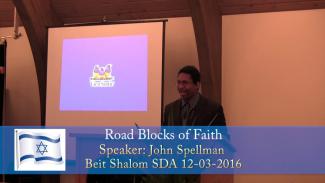Topic: Law
To see more broadcasts select show names, a year, or all video media.Amidst the accusations that Paul was a people pleaser, how did Paul establish the validity of his gospel message? How many gospels are there? What was Paul’s emphasis in the gospel? How could changing this emphasis lead to another gospel? What is the relationship between law and grace? What was the gospel for Paul? What do these things mean for Christians today? Should western culture push tradition on other cultures as we share the gospel?
This quarter we focus on the book of Galatians. What can the life of Paul, starting out as Saul of Tarsus, tell us about the context of Galatians? What were the historical circumstances under which the book was written? What happened in the early church between the Jewish and Gentile converts to Christianity? How can this help us to understand the themes of the book of Galatians?
Peter warns of false teachers that would invade the early church. Does the church still struggle with false teachers today? What were they teaching in Peter’s time? What hints do we have about these individuals in the writings of Peter, Paul, and Jude? What does freedom in Christ really mean? Are we free to live in sin? What effect do false teachers have on the church?
What is true greatness? How did Jesus define what it means to be great? How did Jesus believe those who are great should treat people? How can we compare this with our society today and the way it treats people? What are the ways in which we still break the first and second commandments today? Do we still have images or other gods in our lives? What are the things we still idolize? The book of Matthew illustrates instances in which people, like the rich young ruler, put possessions before God. Many were not willing to surrender everything and entrust it to God.
This week Pastor Michael Mirra focuses on attacks against the Word of God and the inclination of man to resist and not hear or listen to the Word of God. There were times in history when the Bible was not always available to the common person. But was the Bible meant to be read and available to everyone? Were the dark ages because of the Bible, or did the Bible bring us out of the dark ages? Why are there so many who twist the word of God? How do we know that Moses really wrote the first five books? What was so special about Moses?
Elder John Spellman preaches on the Elisha and the healing of the waters of Jericho that were cursed for many years using a cruse of salt. What special message might this hold for us today? Are we like the living water or the corrupted water that makes the land barren?
How does Peter suggest we should act in our social relationships? How should Christians relate to government, superiors, or people of authority? Should Christians play by the rules? Does it make a difference if the powers that be are corrupt? Did Peter’s writings condone slavery? Why does God allow sum to go through oppressive situations? What should a Christian do if their spouse is not a believer?
Did you know that you have a special anniversary with God? There is a special time that He wants to spend with you? A time that commemorates something special. Yet, we always forget it. If we would get angry, disappointed, or hurt when our loved ones forget the times, events, or special occasions that are most important to us, why do we think that it’s ok to do the same thing to God? In this simple presentation, the Sabbath is explained and its relevance to Christianity today.
John Spellman preaches at the Beit Shalom SDA Congregation discussing roadblocks in our faith. How can traditions and customs block us from being able to experience a relationship with God? Should traditions influence how we understand God's Word? What did the prophets think about anything that contradicted the Torah and the testimony? Is it possible that today, with the abundance of YouTube scholars, and misinformation, that many have darkness thinking they have light? While some traditions can be a good thing, many customs and traditions are holding people in darkness.
How did the Old Testament show how important God views justice and mercy? What did the OT prophets have to say about this? Who is deserving of compassion? Should a person show kindness to enemies? What laws existed for the Israelites to show mercy on others and prevent oppression? How were the Israelites to relate to the have-nots among them? What powerful message does this send to Christians today? How did the different types of sabbaths reinforce the principles of equality and freedom? How might the principles of God's government compare with our own today?
How does the Old Testament teach the theme of mercy and justice? How did God's mercy and justice play a role in the way the Israelites were to treat and relate to one another? What message might that have for God's people today? How does God want us to show kindness to those around us? What is the proper relationship between religion and practical faith? Can a person focus so much on religious rituals that they undermine the very principles which God stands for while seeming to practice aspects of their faith? How do the Old Testament prophets speak to this situation?












